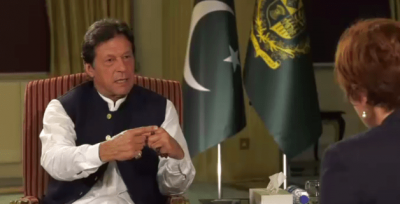Pakistan’s Prime Minister Imran Khan and The Taliban. Russia’s “Balancing Act” in South Asia and Afghanistan
Russia’s flagship international media outlet RT recently aired exclusive interviews with the Pakistani Prime Minster and the Taliban

For as close as Russia has once again become to India following its support of the latter’s “Israeli”-like unilateral moves in Kashmir and the restoration of their unofficial alliance after the recent Eastern Economic Forum, its flagship international media outlet RT proved that it still retains some degree of editorial balance by interviewing both the Pakistani Prime Minister Imran Khan (PMIK) and the Taliban within the past week, signaling that Moscow still has an intent (however vague at this point and imperfectly practiced) to “balance” regional affairs.
.
.
Russian-Indian relations have returned to the unofficial alliance that used to characterize their ties during the Old Cold War following Moscow’s support of its partner’s “Israeli”-like unilateral moves in Kashmir and the successful outcome of the recent Eastern Economic Forum, but that doesn’t mean that Russia has given up on its 21st-century grand strategy of becoming the supreme “balancing” force in Afro-Eurasia.
The “Multilateral Strategic Stability” (MSS) proposal that some of its experts made last week to the Ministry of Foreign Affairs strongly hints that there’s a desire among certain figures who contribute to formulating foreign policy to see to it that their country retains as much strategic autonomy as possible despite the rapidly changing global situation, something that isn’t always messaged by its publicly financed international media which have more or less taken India’s side when reporting on regional issues.
That’s why it’s all the more commendable that Russia’s flagship international media outlet RT recently aired exclusive interviews with the Pakistani Prime Minster and the Taliban, both of which India is adamantly opposed to, thus showing that that the company still retains some degree of editorial balance in spite of the enormous strides that Indian influence has made in Russia since this summer. Coupled with the recent MSS proposal that interestingly coincided with these interviews, it’s clear that Moscow is signaling that it still has an intent (however vague at this point and imperfectly practiced) to “balance” regional affairs. India might have thought that it had succeeded in “buying off” Russia after Modi clinched billions of dollars’ worth of deals at the Eastern Economic Forum the week prior, so it must have been extremely surprising for observers from that country to all of a sudden see RT of all outlets making very unexpected editorial decisions.
That doesn’t mean that the outlet’s traditional bias in favor of India is going to immediately disappear, but just that its executives clearly made the choice to “balance” that out a bit with the two interviews that they just conducted despite India officially being against both of their guests.
It should be noted that these interviews were extremely high-level ones that couldn’t have taken place without approval from the company’s leadership, especially in the case of the Taliban since they’re still formally designated as a terrorist group per Russian legislation, but an exception must have been made owing to the unique circumstances of their political representatives’ arrival in Russia following the abrupt collapse of the US’ promising peace talks with the group. Through this publicly financed entity’s actions, Russia was able to indirectly send the message to India that its foreign policy won’t be “bought off” no matter how many billions of dollars its partner pours into the country.
*
Note to readers: please click the share buttons above or below. Forward this article to your email lists. Crosspost on your blog site, internet forums. etc.
This article was originally published on Global Village Space.
Andrew Korybko is an American Moscow-based political analyst specializing in the relationship between the US strategy in Afro-Eurasia, China’s One Belt One Road global vision of New Silk Road connectivity, and Hybrid Warfare. He is a frequent contributor to Global Research.
Featured image is a screenshot from the interview

